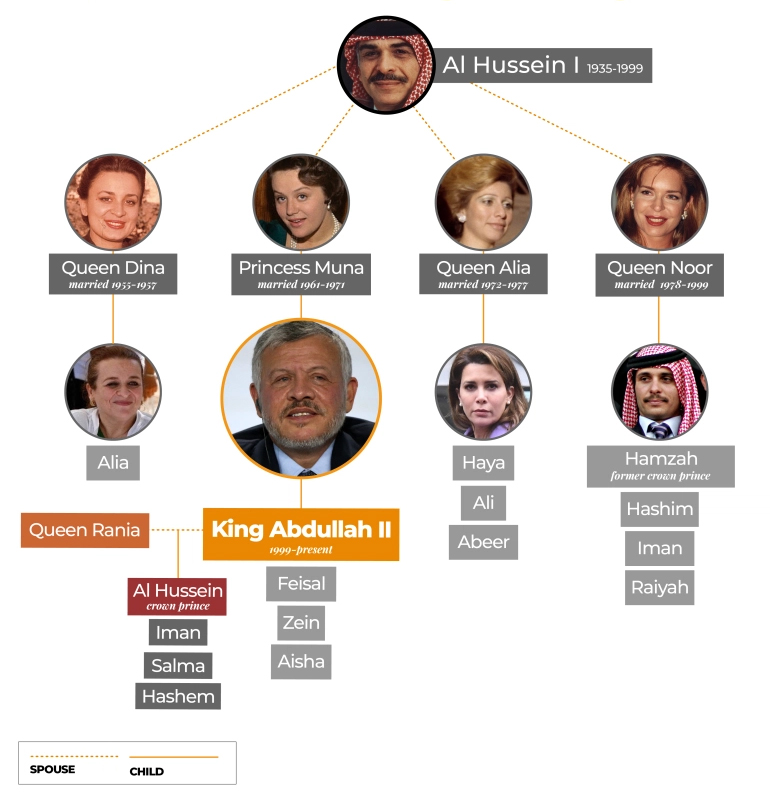The rift between the Hashemite King, Abdullah II, and the former Crown Prince, Hamzah bin Hussein, has burst into the public realm with talk of a coup plot against the king. Palace officials state there was a complex and far-reaching plot that included other Jordanian Royals, tribal leaders and the kingdom’s security establishment. The Hashemites have faced numerous coup attempts in their history, but what makes this different is the very public rift amongst the Royal Family, including the very public criticism by the stepmother of the king accusing him of ‘wicked slander.’[1]But the Hashemite Royal Family faces much bigger challenges than their family rift, the COVID-19 outbreak has exposed the kingdom’s numerous underlying economic problems.
The Hashemite Kingdom of Jordan was and remains an artificial construct. After the dissolution of the Ottoman Caliphate in 1924, the British Empire granted control over the newly formed states of Iraq and Transjordan to the sons of Sharif Hussein ibn Ali, Faisal and Abdullah respectively. Abdullah became the ruler over Transjordan, an entity which never existed previously. Jordan was created purely to fulfil a pledge the British made in 1916 to Sharif Hussein in return for rebelling against the Ottomans. The Hashemites, thus, became the monarchs over an artificial nation. The Hashemites used the indigenous Bedouins to balance the large Palestinian population that were expelled from Palestine since the creation of Israel and who moved to Jordan. Playing one faction against the other has led to numerous conflicts for which the monarchy has acted as mediator. The Bedouin tribal Jordanians have traditionally been the core of the Hashemite monarchy, giving it legitimacy and power through the Hashemite domination of the security services, making them a vital source of support for the monarchy.

The resentment of the Bedouin tribes towards the monarchy has been building since King Abdullah II’s ascension to the throne in 1999. The position of the Bedouin tribes has declined due to losses in the agricultural sector, reduced public spending, privatisation of state-owned enterprises and corruption.[2] As a result, the Bedouin’s support for the monarchy started to wane after being the King’s traditional power base for decades. The 41 year old Prince Hamzah bin Hussein, who is half-brother to the King, was the Crown Prince from 1999-2004 and then stripped of this title. Ever since, Prince Hamzah has been using his relations with the Bedouin tribes to weaken the King’s rule and he has used the country’s economic problems to make regular appearances at protests and meetings to discuss grievances with ordinary citizens. Prince Hamzah openly criticised the government of ‘failed management’ after it passed a law increasing taxes on workers, that lead to thousands to take to the street in the Kingdom.[3] Whilst the King long ignored his half-brother, it seems Prince Hamzah’s cultivation of ties with the powerful tribes, was seen as a threat that had to be dealt with.
Stability in a Sea of Chaos
The Hashemite Kingdom has long had an image of stability in the Middle East, especially with the events that have shaken the region from the creation of the Zionist entity and the wars with it, the Cold War in the region and the rise of leftist regimes, the Iranian revolution in 1979 and the Arab Spring in 2011. The Hashemites were seen as mediators and a reliable player in the region by Western leaders.
The reason for this stability has little to do with the monarchy, but more to do with Britain. British diplomacy and intelligence had been instrumental in stabilising Jordan since it came under the mandate of Britain. It was British strategy to make Jordan a buffer zone in the region, especially for regional conflicts. Jordan has played this role for the Palestinian conflict since 1948. It played that role when the civil war devastated Lebanon in the 1980s. Since 1991 it became a buffer zone for the Iraq conflict as well as a location for a number of rebel groups in the uprising in Syria. This British relationship with the Hashemites has allowed London to keep rival forces, both local and international, from destabilising Jordan since a buffer zone serves the interests of all concerned parties. All the Hashemites needed to do was manage the artificial country domestically in order to play this regional role. However, Jordan has very limited resources and its economy was for long funded by the Gulf States. The global economic crisis from 2008 as well as long term corruption and now the COVID pandemic has turned many ordinary Jordanians and Bedouin tribes against the monarchy.
The economic situation in the Kingdom has for long been desperate. Unemployment is running at 30% whilst poverty in the Kingdom is 20% and the lack of revenues by the government has led to higher taxes against the public. This all took place with the King earning millions from his investments in the West. Queen Rania has long been famous for spending millions on her annual wardrobe, whilst many in Jordan languish in poverty. Some estimates believe she spends over $2 million a year on shoes and bags!
It is not surprising that many experts on the Middle East believe King Abdullah may have engineered this crisis both to silence his critics and to stifle the Jordanian public’s increasing public dissent against the crown. Whilst Prince Hamzah was the most high-profile arrest in the crackdown, King Abdullah also arrested many others who were challenging his rule such as the two prominent leaders of the Al-Majali political clan, who was for long a pillar of Hashemite rule and Bassem Awadallah, a former top aide to King Abdullah, finance minister and envoy to Saudi Arabia, who is also an advisor to Saudi Crown Prince Mohammed bin Salman. This would indicate Prince Hamzah has made progress in building his support base, but has now ultimately failed with the crackdown. Since the alleged coup plot, King Abdullah’s uncles have mediated between the Royals and Prince Hamzah pledged allegiance to King Abdullah days after releasing two clips in which he denounced corruption and poor governance. The agreement takes the immediate sting out of the rare public airing of differences within the ruling family.

Jordan is due to celebrate its centennial anniversary on Sunday 11th April, it will however be dominated by the royal feud. King Abdullah has not resorted to the tactics Mohammed bin Salam (MBS) of the Saudi monarchy used to shore up his position, and this is likely due to the fact that Abdullah senses his management of the country has weakened his own position to take more drastic action. It will be interesting to see in the weeks and months ahead if Prince Hamza has any foreign backing and if this intrigue is part of any regional or international struggle or it is merely a royal intrigue between brothers for power.
[1] Jordan’s Queen Noor says plot attributed to son “wicked slander” | Reuters
[2] Bedouin tribes accuse Jordan’s Queen Rania of corruption | Jordan | The Guardian
[3] Down with the government: Jordan protests new tax law – Middle East Monitor




